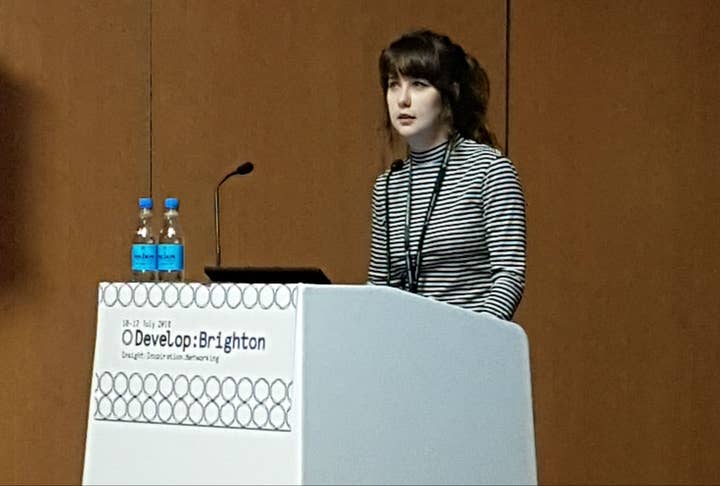Fighting a toxic Steam community - and winning
At Develop:Brighton, Creative Assembly's Grace Carroll said the "visible presence of moderation" was enough to turn around a toxic Steam forum in just a week
Battling a toxic Steam community is a more straightforward task than one might think. According to Creative Assembly's Grace Carroll, the Total War developer turned its own forum around by simply taking part; the "visible presence of moderation", she said, was enough to make a huge difference in the space of just a week.
Speaking at the Develop:Brighton today, Carroll gave a detailed and illuminating talk on community management, a field that she stressed is more integral to the success and survival of a studio than many developers believe.
"A lot of studios will think of community as kind of fluff," said Carroll, who is lead social media manager at Creative Assembly. "It's kind of important, but it's not making the game, right?
"But community is very important. The community is literally your players, the people that buy and play your games. They're who you're making it for, so you want to value them and you want to have a representative in your studio.
"Because our games are about wars and things, it can get quite political, and our forums were just not a very nice place to be"
"If people are interested in your game they're going to Google it, and they're going to find your Facebook, your Twitter, your sub-Reddit, and if they see a Reddit that's dead or a forum that's full of angry comments they won't want to buy the game and they won't want to engage. They're going to think, 'that's a toxic community that I don't want to be a part of.'"
Social platforms like Facebook and Twitter are a more common first point of contact now than a website or Steam page for almost any game, Carroll said, and what someone sees when they get there can be influential. What they see if they choose to look at Steam is also important, and in that respect Creative Assembly had a problem to assess in the not too distant past that will be familiar to many developers.
"We just had a very good Steam clean-up," Carroll said. "Our forums were highly toxic. Because our games are about wars and things, it can get quite political, and our [Steam] forums were just not a very nice place to be."
Doing something to arrest that kind of problem is a daunting challenge for any developer, but it's a problem that tends to get worse over time. "If you have a toxic audience it's going to stay that way, because the nice people are going to leave," Carroll said. "They don't want to be in that environment."
However, while the dynamic may sound irredeemable, Creative Assembly found that a huge difference could be made through relatively simple action. Carroll set a new employee on the community management team the task of going into the Steam forums to make some improvement, however minor - fully aware that its toxic atmosphere could mean it was not "a workable plan." The results were surprising.

"Just having that visible presence of moderation, knowing that someone was deleting threads and banning people, turned it around in about a week," Carroll said. "People start to self-moderate. They tell each other off. They start reporting things.
"This forum, honestly, was an awful place to be, but the minute that people were getting bans, and the minute they realised that, A, there are consequences for their behaviour and they couldn't just do and say whatever they wanted, and B, that they weren't just shouting into a void and they were being heard.
"Just having that visible presence of moderation... People start to self-moderate. They tell each other off. They start reporting things"
"If someone posts a really awful comment, and I reply - 'oh sorry you feel that way, feel free to not buy our games' - they're like, 'oh my god, I didn't think you'd read it, I didn't think you'd reply to it'. The attitude can turn from horrible to apologetic straight away."
The fact that people were being banned is significant of just how toxic the environment on the Steam forums had become. Later in her talk, Carroll said that banning people is "a last resort" in her usual practices; a punishment reserved for spamming or people being "outright offensive." It is rarely applied to trolls, she said, "because I feel like trolls are still pushing conversation and pushing engagement."
Carroll also emphasised the benefits of allowing some dissent or divisive topics to exist, as long as they are contained in what she called "a lightning-rod thread."
"It's also quite nice sometimes to have a lightning-rod thread, where everyone who has that kind of opinion will just keep it contained, instead of spreading that negativity. If you get rid of all those conversations completely, people are just going to keep starting them over and over."
However, the most important factor community management, on any platform, is often just being there. Regardless of how toxic a specific part of the community has become, she said, it isn't necessarily a lost cause. Showing that the studio has someone there, to listen, to respond and (on occasion) to ban can make all the difference.
"One of the biggest lessons is, whichever platforms you're on, make sure that you have the resources," Carroll said. "Start off in two key places and then see if you can stretch to more, because the most important thing for all of them is being a visible presence.
"Otherwise it's like a school when the teacher doesn't show up. It's going to turn into chaos."
